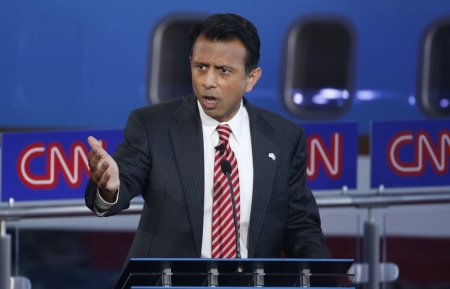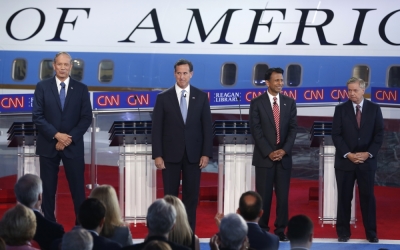Bobby Jindal at CNN Debate: Biggest Discrimination in America Is Against Christians Who Believe in Traditional Marriage

Former Louisiana Gov. Bobby Jindal and other second-tier Republican presidential candidates shared differing views Thursday night on whether Kentucky clerk Kim Davis and other public officials have the right to exercise their religious belief in traditional marriage while serving public office after the Supreme Court has nationalized same-sex marriage.
During CNN's first Republican presidential debate at the Ronald Reagan Presidential Library in California, which featured the four lowest polling GOP presidential nominees, Jindal was first asked to give his opinion on the 14-year-old Muslim student in Texas who was wrongly arrested for bringing a clock to school and how America should handle the fine line between keeping America safe from radical Islam and not discriminating against Arab-Americans.
After Jindal gave a response bashing radical Islam that challenged Muslim leaders to stand up against extremism, he added that the biggest discrimination problem that America should be focusing on is the discrimination against Christians who publicly stand by their religious belief in natural marriage. Jindal referenced Davis, a Christian Kentucky county clerk who was jailed last week for refusing to issue marriage licenses due to her objection to having her name and title authorizing same-sex marriage certificates.
"In America … right now, the biggest discrimination going on is against Christian business owners and individuals who believe in traditional forms of marriage. They are throwing this woman in jail in Kentucky. Let's talk about that," Jindal asserted. "Let's talk about the Christian bakers, florist, caterer and musician who simply want to say, 'Don't arrest us or don't discriminate against us, don't shut down our businesses, don't fine us thousands of dollars for believing marriage is between man and a woman. Let's talk about not discriminating against Christians."
Jindal's comment jumpstarted the debate about Davis and if she and others have the Constitutional right to stand by her religious convictions while holding an elected public office.

Former New York Gov. George Pataki was quick to offer his criticism of Davis for not following the new Supreme Court-mandated law of the land and suggested that he would have fired Davis if he was her boss.
"Yes, Kim Davis is different from Islamist radicals from the Middle East but on the other hand, we have one rule of law in America. An elected official can't say that 'I am not going to follow that law if it conflicts with my belief,'" Pataki said. "I think that she should have been fired and if she had worked for me, I would have fired her."
"We have to uphold the rule of law. Imagine one minute that was a Muslim who said that 'I don't believe in gay marriage and refuse to perform that wedding.' We wouldn't have had that outrage," Pataki added. "There is a place where religion supersedes the rule of law. It is called Iran. It shouldn't be the United States."
Former Pennsylvania Senator Rick Santorum quickly responded to Pataki by saying that objectors to the Supreme Court's June ruling making same-sex marriage a constitutional right need to defy the "unjust law," just as, he claimed, Martin Luther King Jr. would have done.
"We need as a president who is going to fight a court that is abusive and supersedes its authority," Santorum argued. "Judicial supremacy is not in the Constitution, and we need a president and a Congress to stand up to the court when it exceeds its constitutional authority."
Pataki was baffled by Santorum's remark.
"Wow! We are going to have a president who defies the Supreme Court because we don't agree? Then you don't have the rule of law," Pataki quipped. "Elected representatives of the people always have the opportunity to change that law. The Supreme Court makes a determination, but it is ultimately the elected officials that decide whether or not that would be accepted."
Santorum then mentioned King's "Letter from a Birmingham Jail" to justify religious objectors standing up to the Supreme Court's ruling.
"I didn't agree with the Supreme Court's decision but it is the law of this land," Pataki responded. "I am a great admirer of Martin Luther King. He was prepared to break the law but it wasn't in political office. It was civil disobedience."
Jindal weighed in again saying that simply exercising a First Amendment right of religious freedom does not violate the law.
"I would like the left to give us a list of jobs that Christians aren't allowed to have — bakers, musicians, caterers. Are we allowed to be pastors anymore? We are not allowed to be elected officials anymore," Jindal said. "The right to religious freedom is in the First Amendment. It isn't breaking the law to exercise our Constitutional rights."





















